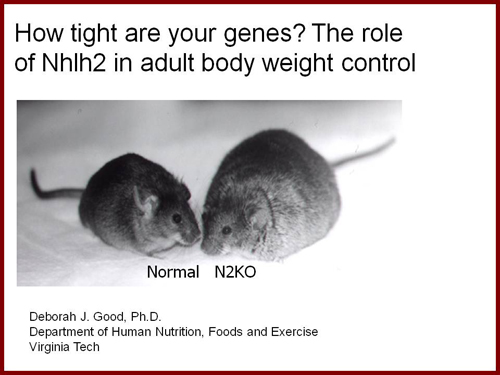Deborah Good
- Department of Human Nutrition, Foods, and Exercise
- College of Agriculture and Life Sciences
Synopsis:
Dr. Good studies the molecular genetic regulation of body weight, with a focus on physical activity, gene regulation and the human genetic condition, Prader-Willi Syndrome. Her laboratory uses mouse models, and both mouse and human cell lines, to study pathways intersecting the Nhlh2 transcription factor, and its gene regulatory targets.

Description:
Physical inactivity can lead to obesity, diabetes and several other health concerns. The Nhlh2 gene is one of only a handful of genes that have been specifically shown to regulate either the ability or motivation for physical activity. Dr. Good's lab uses mouse models, and human genetic information to identify the mechanisms and the possible solutions for physical inactivity.
Dr. Good's research is interdisciplinary in nature and she coordinates multiple projects with faculty across campus, the U.S., and internationally. Currently she is working on several projects related to the human genetic condition, Prader-Willi Syndrome (PWS). PWS affects approximately 1 in 10,000 live births, resulting in developmental delay, intellectual disability, high anxiety, physical inactivity, and later onset obesity. Her laboratory has recently discovered that one of the genes that are deleted in individuals with PWS post-transcriptionally controls high level expression of NHLH2 mRNA and protein. As the phenotypes of the N2KO mouse, which contains a full targeted deletion of NHLH2, and PWS patients, significantly overlap, this regulatory pathway may explain the PWS etiology.
Ultimately, Dr. Good would like to understand the genetics of physical activity levels in both normal and disease conditions, and determine if there are specific polymorphisms in genes that predispose people to low physical activity levels. These studies will help scientists develop therapies directed at those genes and combat obesity.


